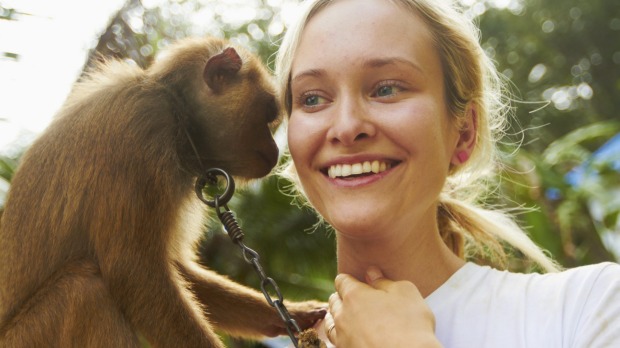
Our family supports animal cruelty. Yours probably does too. It's entirely unintentional. But it's hard to say "no" to kids on holidays.
Over the past decade we've walked with lions, watched performing dolphins, driven through bear parks, charmed the cobras, taken selfies with tigers, and toured a civet coffee plantation.
But the cruellest wildlife attraction is the elephant ride, according to a new report commissioned by World Animal Protection.
It's also among the most popular family experiences for tourists in Thailand, where around 1300 of the beasts are held captive.
"Baby elephants are still suffering a horrific training process called 'the crush', which forces them into submission," the report reads.
And it's not the odd dodgy operator: Research by the University of Oxford's Wildlife Conservation Research Unit reveals three out of four wildlife tourist attractions involve animal abuse.
That's more than half a million animals, which are stolen from their mothers, beaten, and trained to be passive.
But there's big bucks in this despicable business.
Global tourism is a trillion dollar industry: one quarter is driven by demand for interactions with wildlife. (Try getting between a tourist attraction and a dollar…)
That's why we have to reduce the demand.
After reading 50,000 comments on TripAdvisor, the researchers say 80 per cent of tourists leave positive reviews for venues that are treating animals cruelly.
"It's clear that thousands of tourists are visiting wildlife attractions, unaware of the abuse wild animals face behind the scenes," Kate Nustedt, Director of Wildlife at World Animal Protection, says.
When people are told about the cruelty, they choose not to go. This is a wise decision – and not just for the sake of the animals.
Recently, 36-year-old Brit Gareth Crowe was trekking on an elephant in Koh Samui when it attacked, killing its handler before trampling and stabbing the tourist, while his 16-year-old stepdaughter watched in horror.
Believe it or not, there's no global regulation on how animals are used in tourism. World Animal Protection wants to inform travellers – and the industry – of the truth.
"If you can ride it, hug it or have a selfie with a wild animal, then you can be sure it is cruel. Vote with your feet and don't go," the organisation says.
So far, 87 travel companies have signed up to stop elephant rides and shows. But we writers should support the cause, as well.
These days, I scour an itinerary for animal interactions. Then I explain to the tourism authority why we won't be doing it.
For a long time, we thought we were helping poor communities. But there are programs to retrain those working in the business of animal cruelty.
Sure, the kids still want to kiss a dolphin, hold a baby turtle, or play with a monkey.
But it's our job as parents to teach them to think critically. What's going on behind the scenes? How do they train the animal to do that? Do you want to support this treatment?
The advice is simple: Just say no.
See worldanimalprotection.org.